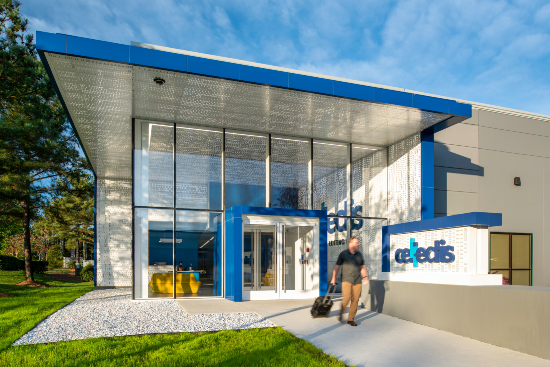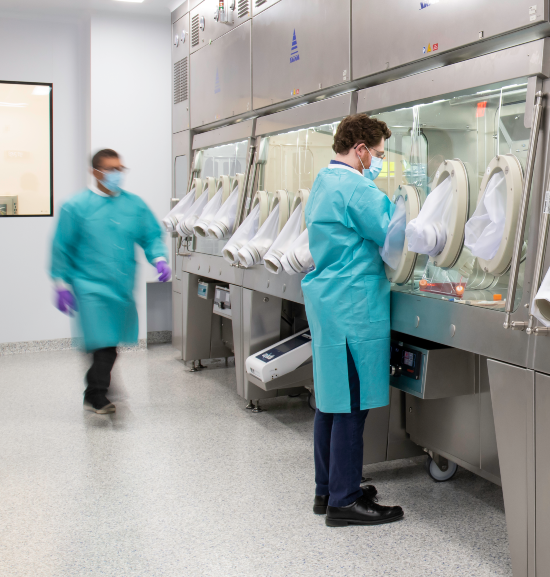
Cellectis Announces First Patient to Receive CAR T-Cell Therapy Candidate Made in its Raleigh Facility
Paris-based biotechnology company Cellectis (NASDAQ: CLLS) has announced the first patient in the U.S. to receive a dose of its UCART22 allogeneic CAR T-cell therapy product candidate that was manufactured in-house at the company’s GMP manufacturing facility in Raleigh.
UCART22 was developed for B-cell acute lymphoblastic leukemia (B-ALL) that has recurred or not responded to other treatment. The patient completed the initial 28-day dose-limiting toxicity period without any complications.
The new therapy is being evaluated in a Phase 1/2a open-label dose-escalation study designed to evaluate its safety and clinical activity. “We've had this clinical trial running for three years, and this is the first time that we've made UCART22 in-house, completely under Cellectis’ control,” said Steven Doares, senior vice president, U.S. manufacturing and Raleigh site head. “It's a big milestone for us and everyone's excited about it. “

UCART22 is made by taking T cells from healthy donors and genetically modifying them to seek out and destroy cancer cells containing a protein called CD22. The product candidate was developed as a potential therapeutic alternative for B-ALL patients, including patients who have relapsed from or can’t receive CAR-T cells directed against the CD19 antigen.
The autologous CAR-T cell therapies currently on the market come with high costs, in part, because they rely on patient-derived T cells. This means that each therapy batch is manufactured for a single patient. Allogeneic therapies such as UCART22, however, use T cells from qualified healthy donors. This approach allows multiple patients to be treated using a single batch.
Raleigh-based in-house manufacturing
“Like many cell therapy and gene editing companies of our size, our clinical products have historically been made by contract manufacturers,” said Doares. “Three years ago, the company embarked upon internalizing GMP manufacturing both in Paris and in Raleigh. Both facilities are now online, with the Paris facility manufacturing our critical starting materials, and Raleigh manufacturing drug substance and drug products.”

With so many cell and gene therapy startups competing for the same contract manufacturing space, a small glitch in a process development timeline can mean losing a manufacturing slot without any definitive timeline on when that can be rescheduled, says Doares.
Moving manufacturing processes in house gives Cellectis far more control of its timelines, which is critical for moving clinical trials forward. It also provides more flexibility because the company can quickly switch from manufacturing one product to a different one.
“Additionally, if a new version of a product is needed based on the advice of the medical scientists, that becomes much easier to accomplish in house because we're used to doing the tech transfer from Paris,” said Doares.
So far, the company has manufactured two products in the Raleigh facility, with a third one currently under way. The facility is designed to expand from small-scale batches for clinical trials to the larger scales needed for commercial manufacturing. There are currently two CAR T-cell manufacturing suites and room to create two more.
Strengthening NC's gene and cell therapy hub
“We decided to locate in Raleigh because it has a wonderful ecosystem with a number of other gene therapy and cell therapy companies in addition to some larger, more established pharma and biopharma companies — so there's a workforce that's used to working in the GMP environment,” said Doares. “The excellent universities in the area also turn out engineers and scientists and other people who support other functions that we need such as finance and HR.”
He adds that creating the Raleigh facility also required highly specialized construction and skilled trades, which were available because there are so many biopharma-related capital projects in the area and hence a good cohort of construction management companies and skilled trades in the Triangle region.
“It is incredibly exciting to see North Carolina’s strengths in biomanufacturing combined with Cellectis’ gene editing expertise advance innovative and potentially lifesaving therapies for patients,” said Laura Rowley, Ph.D., vice president of life sciences economic development with the North Carolina Biotechnology Center. NCBiotech provided technical due diligence in support of Cellectis’ recruitment.
“Cellectis has been dedicated to leveraging gene editing technology to provide a cure for multiple cancers for over two decades. As more gene- and cell-based therapies garner positive results in the clinic, N.C.’s life sciences community continues to evolve and remains committed to creating an environment that enables their success.”
As the clinical trial progresses through its dose escalation, the UCART22 product candidate will continue to be made at the Raleigh Cellectis manufacturing facility. The company is also planning now for transitioning into pivotal trials at some point in the future. “We also look forward to any new products that the innovation and development teams give us for other types of cancers and manufacturing those in Raleigh,” said Doares. “None of these new programs will go to a contract manufacturer anymore.”
